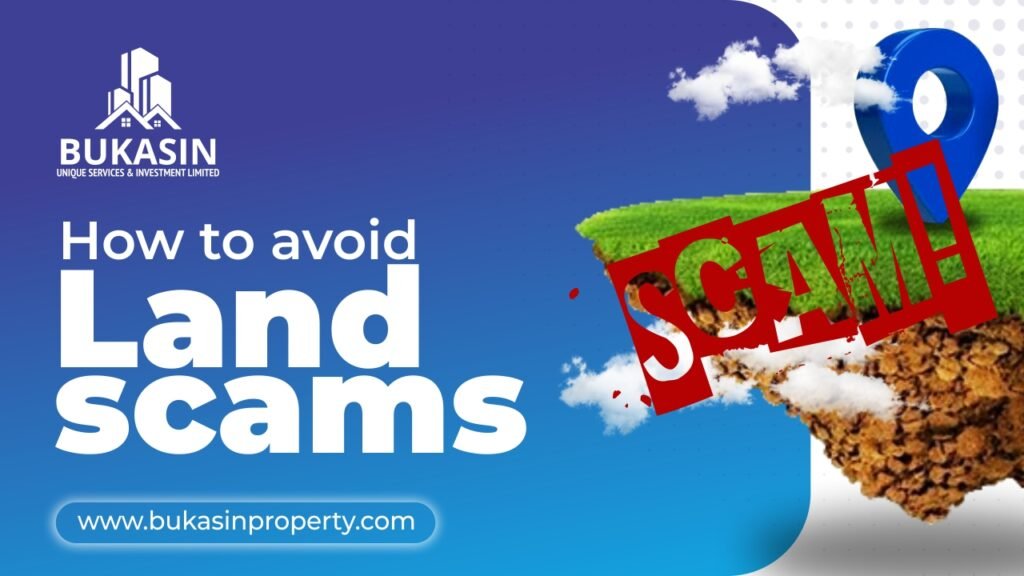Buying land can be an exciting step toward securing your future or expanding your investments. However, land scams and fraud are a growing concern in Nigeria and elsewhere. Scammers are always looking for ways to take advantage of unsuspecting buyers, leaving them with no land and empty pockets. To avoid falling into these traps, it’s essential to arm yourself with knowledge.
In this guide, I’ll walk you through practical tips on how to avoid land scams or fraud. Let’s get started!
1. Research, Research, Research
Before you make any decision, research is your best friend. You need to:
- Know the Seller: Verify if the person selling the land is the rightful owner. Ask for their ID and make sure their name matches the documents.
- Check the Land’s History: Find out if the land has been involved in any disputes, or if it’s been sold to multiple buyers.
- Location: Visit the land physically. Google Maps may show you pictures, but nothing beats seeing the land with your own eyes.
2. Inspect the Documents
Land documents are vital. Here are some key documents you should ask for:
- Certificate of Occupancy (C of O): This is proof that the government has given the right to use the land. Without this, the land could be government-owned.
- Deed of Assignment: This document transfers ownership from the seller to the buyer. Ensure it’s signed and stamped.
- Survey Plan: This shows the exact boundaries and location of the land. Ensure the survey is legitimate and not forged.
Pro Tip: Hire a trusted lawyer to cross-check these documents for authenticity. This will save you from being duped with fake papers.
3. Avoid ‘Omonile’ Issues
You’ve probably heard of the notorious ‘Omonile’ – land grabbers or local “landowners” who appear out of nowhere, claiming rights to the land. They may demand you pay “settlement” fees. To avoid this:
- Buy from Reputable Sources: Purchase land from verified real estate firms, not random individuals. Established companies handle these issues so you don’t have to.
- Get Court Injunctions: Some buyers go the extra mile to obtain a court order barring any ‘Omo Onile’ from harassing them.
4. Avoid Sweet Deals
When something seems too good to be true, it usually is! Scammers often entice buyers with land offers way below the market price. Don’t rush to buy just because it’s cheap. Here’s what to do instead:
- Compare Prices: Check the average land prices in the area. If the land price seems much lower than usual, investigate.
- Ask Questions: Why is the land so cheap? Is there a problem with it? Sellers should be able to give solid reasons.
5. Confirm Land Titles
Many people fall into fraud traps by not confirming the land titles. It’s essential to:
- Verify Land Ownership at the Land Registry: Visit your state’s land registry to confirm if the land is legally registered in the seller’s name.
- Do a Land Search: A thorough search at the Land Bureau will reveal whether the land has any legal restrictions, disputes, or outstanding payments.
6. Hire a Lawyer
Buying land without legal assistance is like jumping into the ocean without a life jacket. Your lawyer will:
- Verify Documents: Make sure the documents are legit.
- Negotiate Terms: Ensure the terms of the sale are in your favour.
- Draft the Contract: Protect your interests legally by drafting proper agreements.
A good real estate lawyer knows the land laws and can spot red flags you might overlook.
7. Document the Sale
When you’ve confirmed everything and are ready to proceed:
- Sign the Contract: Ensure that both parties (buyer and seller) sign the contract and that your lawyer witnesses it.
- Register the Land: Once you’ve purchased the land, register it in your name at the appropriate land registry. This makes your ownership official and recognized by the government.
- Ask for Receipts: Always demand a receipt, signed by the seller and your lawyer.
If a seller refuses bank payments, that’s a red flag.
8. Avoid Pressure to Buy Quickly
Scammers often push you to make fast decisions. They may say things like:
- “There’s another buyer ready to pay!”
- “You have to pay immediately or the deal is off!”
Don’t fall for this. Take your time, review all the documents, and consult with your lawyer. Scammers create a false sense of urgency to make you rush into a bad deal.
9. Get References
Before you buy from any seller or real estate firm, ask around. Look for:
- Customer Reviews: Check online reviews or ask other buyers for feedback on their experiences.
- Recommendations: Trustworthy referrals from family or friends can save you from falling into a scam.
Final ThoughtsLand scams can ruin your dreams of becoming a landowner, but they can be avoided with the right precautions. Always be cautious, don’t rush, and consult professionals at every step. By following these tips, you’ll be on your way to a secure and scam-free land purchase!
When it comes to land, remember: “If you’re not sure, don’t buy!”
Stay smart, stay safe, and happy land hunting!

